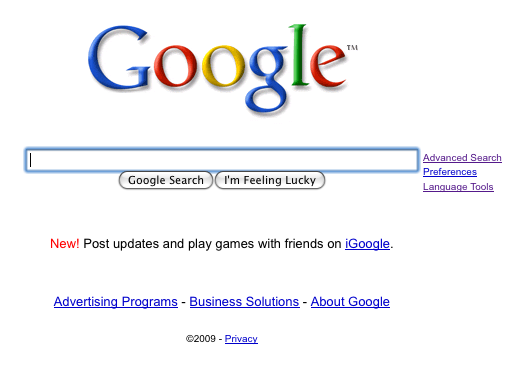
You own and run a website, you sell widgets, your competitors are way above you in the search engine rankings and you want to be up there too.
You have spent hours clicking your website in the Google results again and again in the vain hope that it will somehow improve your rank, but you’re not getting anywhere… sound familiar?
Search engines can be elusive at the best of times. Their prime objective is provide relevant search results to the end user, and though they do offer paid advertising services – Google adwords is the most common example - their core function is help people find information on the web that is relevant to what they are looking for.

As a widget business with web as your main channel to market, getting your web site onto the first page of Google when people search for ‘widget’ is high on your agenda and you see Google as a very important marketing tool.
Oh Dear...
If you haven’t already figured it out, this presents a dilemma. From the search engine’s point of view it doesn’t matter whether you’re a business selling widgets or non-profit widget forum; as long as you have content on your site that is relevant to the phrase that was searched for, you’ll appear in the search results. Where you appear in the results on the other hand is entirely down to the search engine’s opinion on the relevance of your website.
Search engines do not, and never will, place any weighting on the fact that you are a business and that you rely on them to make a living. If they did give preference to commercial businesses, all of that wonderful, free information about widgets that fuel the interest in your products would disappear out of the search results, being replaced simply by a list of advertisements for where to buy them. People would then stop using the search engine, favouring other search engines that provide relevant results.
So How do I Improve My Ranking?
Ok ok, I’m getting there!
To do well in search results, you have to convince the search engines that your website is relevant to the phrase that the user is searching for. Simple. Or is it?
The answer, unfortunately, is that it’s not that simple. Developing and maintaining a good search engine ranking takes a lot of hard work, and it’s an ongoing activity.
The following, four tiered approach, however, should provide you with a good start:
- Choose the search terms or ‘keywords’ that you would like to be ranked on. In your case, you would like to be ranked highly on ‘widgets’, ‘widgets online’, ‘quality widgets’ or ‘cheap widgets’.
- Make sure your site has content that is relevant to each of these keywords.
- Make sure that the information on your site can be viewed by the search engines.
- Develop a network of links to your site from other sites that are related to your selected keywords.
If you fancy going into these steps in a bit more detail, go and make another cup of coffee, then continue reading!
1. Choose your keywords
Selecting your keywords is an important exercise. They form the foundation for your ongoing efforts in improving your ranking, and there are a few guidelines that you should follow:
- By all means brainstorm as many keywords as you can think of, but once the brainstorm is over select around 5 – 10 that you would like to focus on. If you try to optimise your site for 100 keywords, you won’t do very well, as the impact of those 5 – 10 important keywords will become heavily diluted.
- When selecting your keywords, choose ones that are specific to the items that you are selling. Getting a good rank for ‘DVD’ will be massive task due to the vast number of other businesses competing for that position. Getting a good rank for ‘snowboarding DVD’ however would probably be a lot simpler and as such would provide a much better return on your efforts.
- Once you have selected your keywords, search for them in Google, and check out your competition. If you look at the results and think “I should be in that list! I sell more than all those guys put together!!” then you’re probably onto a winner. If you look at the results and think “Oh dear, I’m small fry compared to these guys”, ditch the keyword in question and select another one in its place.
- If you can get access to your website stats online, look for the section entitled ‘keywords’ or ‘search terms’. This section will provide you with the details of which keywords are driving people to your site at the current time. Take the top 4 or 5 keywords from this list too, as these are terms for which you are already ranked quite well for, and you will almost definitely be able to squeeze a bit more goodness from them.
2. Make sure your site has content that is relevant to your chosen keywords
You’re probably thinking to yourself “I sell widgets, my site has thousands of widgets, I already have lots of relevant content on my site”. This is true to some extent, however relevant content can take many forms, only one of which is an entry in an online product catalogue.
Examples of relevant content would be product reviews, both from yourselves and from customers, blogs, articles, news; the list goes on. If you want to increase the relevance of your site you should think about adding some non-commercial content such as this, content that is useful to your customers and will make them visit your site more often. You will find that if you take this approach, the search engines will visit your site more often too. They love fresh content, and sites that are updated regularly will benefit from an improved ranking.
When drafting text to go on your site, especially for frequently visited pages such as the home page or popular product pages, make sure that you throw in your all important keywords as much as you can. Remember however that it is important to maintain a sound grammatical flow.
3. Make sure that the information on your site can be viewed by the search engines.
What an earth does this mean? Don’t search engines see the same information that we see? The answer to this question is no, they don’t. When a search engine visits and reviews your site, it is very rarely a human that is doing the reviewing.
In 99.9999% of cases, your site will be visited by a ‘search engine spider’. Though it sounds creepy, this ‘spider’ is nothing more than a piece of software running on a computer somewhere deep within the bowels of an enormous data centre. The spider will load up your site and systematically browse through every page, storing all of the text in a database. The search engine will then apply some very complex algorithms to the text from each page, extracting the keywords and allocating a page rank as it goes.
Now, the thing is, these search engine spiders have a very different view of the web to ours. They don’t see the different font sizes, colours or the layout that we see when we load up a website in a standard browser. All they see is a stream of text, text that would look like complete gobbledygook to anyone who is not a web developer.

What the Search Engines Spiders See

What we See
In order for the search engines to analyse this text correctly, the spiders must be provided with markers to indicate which text is heading for example, which text is part of the main menu, and where paragraphs begin and end.
In addition to this, they won’t be able to see images, so having any kind of text rendered as an image should generally be avoided.
Other technologies such as Flash also create issues for search engine spiders. Though most modern search engines can read the text that is embedded with Flash based websites, this text is rarely stored in an orderly manner and so a lot of the time Flash based websites don’t get the search engine ranking they deserve.
There are many things you can do to help the search engines understand the structure and the content of your website, for example most search engines nowadays allow you to manually submit a site map, which gives their spiders a framework against which they can analyse your site.
Playing around with your site at the search engine spider level can get very complicated, and without the right expertise, things can go horribly wrong. As such, I would always recommend getting professional assistance with this stage.
4. Develop a network of links to your site from other sites that are related to your selected keywords
Inward linking – the process of obtaining links to your site from other sites – remains the most powerful tool in improving your search engine ranking.
Something I didn’t mention about search engines in the previous section was that, when analysing your website, they look both the content of your website and the content of all the websites that link to your site.
A search engine such as Google has a record of pretty much every publicly available site on the web, including all the links on those sites. When it reviews your site it searches this enormous database for links to your site, and uses this information in defining your page rank.
It should be noted also that the search engines will place considerably more weight on certain types of link than others. For example, let’s say you write a great article about how you can properly look after your special type of widget and you publish this article on your website. A few people who have an interest in widgets stumble across your article either via a link that you send them or simply from browsing through your site. They love it so much that they decide to link to your article from their widget blog, or they decide to start a thread on a widget forum to discuss the topics you talked about in your article. Both of these links come from widget-orientated websites, which the search engine will be well aware. When it reviews your article it will detect all of these relevant links and, from this, it will deduce that your article must be very useful and so it will increase the rank of both your article and the site as a whole. Result!
Publishing your link on a website that has nothing to do with widgets will achieve very little in terms of search engine ranking.
There are many more ways to enhance your ranking through link building, however this article is designed you an overview so I won’t go into any more detail. I have published a few useful links at the end of this article that provide a bit more information.
Final Words
Improving the rank of your site can be a daunting task and complex task. The points outlined in this article however should help you take your plans to the next step. At least when you speak to your web developer you have an idea of what he’s talking about when he talks about ‘link building’ or ‘search engine spider’.
Beware though, any developer who promises to get you to number 1 in Google, or even onto the first page should be treated with caution. However much work you put into search engine optimisation, you can never guarantee anything. This is probably the most frustrating thing about search engine optimisation; it’s not that simple, and that’s why a flourishing industry has built up around it.
You should also steer clear of companies that get in touch and offer to publish your link throughout its “network of high quality sites”. A lot of the time, this will result in a link to your site appearing on a load of sites that have little or no relevance, and exist only for the purpose of publishing links. If your site appears on one of these ‘link farms’, there is actually chance that it could have a negative effect on your ranking, pushing you further down the results.
Links for Further Reading
Google web master guidelines
How to Build Links Fast
Page rank Checker
Getting Noticed on Google
Site Map Generator
How to Write Great Blog Content
Awesome article about link building
About the Author
Patrick Cunningham was born and raised in Guernsey, Channel Isles. He is a web developer and director of Indulge Media Ltd.




